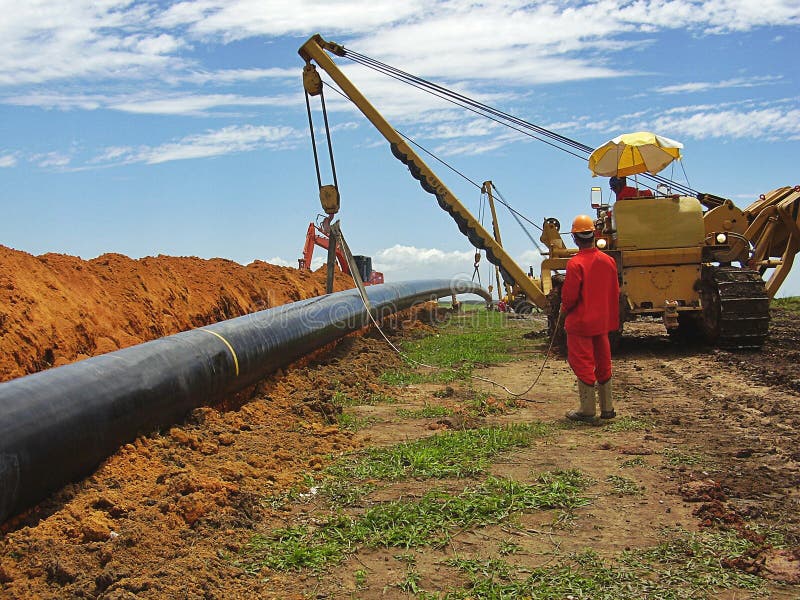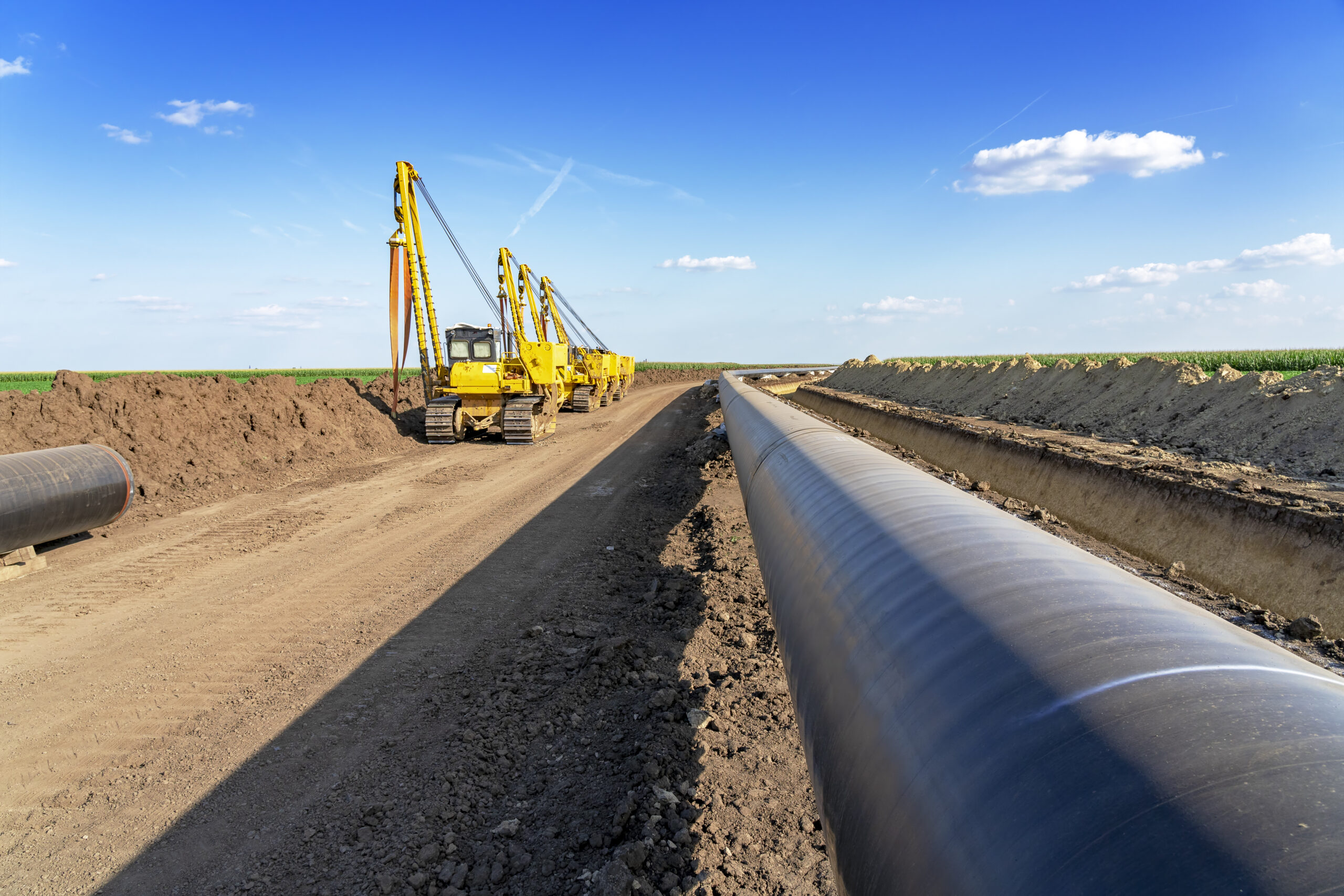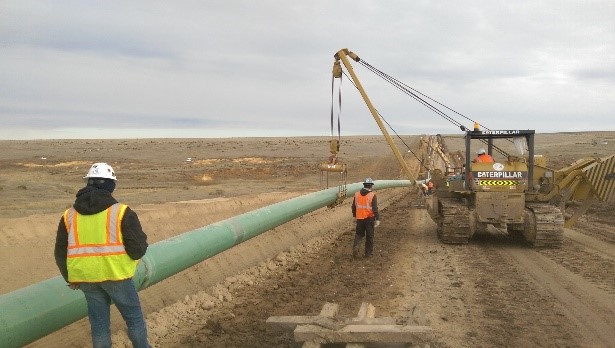Why Pipeline Construction Is Necessary for Energy Facilities Development
Pipeline construction plays a crucial role in the advancement of energy framework, functioning as the backbone for the transport of essential resources like oil and all-natural gas. This detailed network not just promotes reliable circulation but also boosts economic growth via work production and regional investment. In addition, advancements in security technologies are addressing environmental issues, placing pipelines as a cornerstone of sustainable energy approaches. The intricacies bordering pipeline jobs raise vital concerns regarding governing frameworks and their long-term impact on communities and environments. Discovering these measurements reveals a diverse story that requires cautious consideration.
Function of Pipelines in Power Supply
The important duty of pipelines in energy supply can not be overemphasized, as they work as the foundation of modern-day energy framework. Pipelines are crucial for the efficient transportation of different forms of power, consisting of oil, all-natural gas, and fine-tuned items. They promote the activity of these sources from extraction sites to refineries and circulation centers, guaranteeing that power reaches customers in a timely manner.The construction of pipelines involves thorough planning and adherence to regulative criteria, showing the complexities of the power market and environmental considerations. Efficient pipeline networks are developed to minimize transportation times, minimize prices, and enhance security, while additionally attending to possible environmental effects. The capability to transfer large volumes of power over fars away makes pipelines a favored option for energy companies wanting to enhance their supply chains.Moreover, pipelines contribute to power security by branching out supply routes and resources. As international power needs vary, pipelines enable areas to gain access to different energy materials, mitigating dangers connected with reliance on single sources. This diversification fosters competitive pricing and stabilizes markets, which is critical in a significantly interconnected global economy.In addition to their logistical advantages, pipelines sustain neighborhood economic situations by creating tasks throughout construction and maintenance stages. The existence of a robust pipeline framework also brings in investments in power projects, additionally boosting local development. Eventually, pipelines are vital to the power market, giving a trustworthy and efficient methods of transport that underpins financial development and sustainability.

Advantages of Efficient Transport
Reliable transportation through pipe systems uses substantial benefits, including reduced transport expenses and boosted delivery rate. These benefits not only enhance the total business economics of power distribution however also play a crucial duty in lessening the ecological influence related to energy transportation. As power demands remain to climb, the value of optimizing transportation approaches comes to be progressively noticeable.

Reduced Transportation Expenses
Reduced transport expenses represent a significant benefit in the domain of energy framework advancement. The construction of pipelines provides a much more financially viable methods of transporting power resources compared to alternate methods such as trucking or rail transportation. Pipelines, when established, permit the constant flow of oil, gas, and various other items over fars away with minimal operational costs.One of the main factors for lowered transport expenditures is the performance of pipeline systems. They can move huge volumes of products all at once, thereby spreading out repaired prices over a greater quantity of product. This mass transportation capacity significantly reduces the cost per system, making energy sources a lot more inexpensive for consumers and businesses alike.Additionally, pipelines decrease the dangers and expenses related to handling and storing unpredictable materials. Unlike rail or roadway transportation, which can incur delays and damages, pipelines provide a more secure and extra constant technique of power conveyance. This reliability boosts the financial expediency of power projects, allowing for better prices structures in affordable markets. Inevitably, minimized transportation costs foster an even more sustainable power sector, advertising broader accessibility and encouraging financial investment in more advancement.
Improved Shipment Speed
Pipelines significantly enhance delivery speed in power transport, providing a crucial benefit over traditional methods such as trucking or rail systems. The continuous circulation of products with pipelines permits a stable and reliable transportation procedure, lessening delays connected with loading and discharging. This consistent motion is especially necessary for power resources, where demand can fluctuate rapidly.Moreover, pipelines can operate around the clock, unaffected by web traffic conditions or weather-related disruptions that can hinder roadway or rail transportation. This dependability guarantees that power products reach customers promptly, sustaining functional needs and strengthening economic stability. Furthermore, the scalability of pipe systems assists in the handling of large volumes of power, which is crucial for fulfilling the expanding requirements of sectors and domestic sectors.Furthermore, the assimilation of innovative monitoring and control modern technologies in pipe systems boosts the delivery procedure. These technologies permit real-time tracking of flow prices and system stress, ensuring that any possible issues are resolved quickly. Overall, the boosted delivery rate supplied by pipelines is a considerable consider enhancing power facilities and ensuring that supply chains continue to be robust and responsive to market demands.
Environmental Impact Factors To Consider
The benefits of speedy energy transport prolong beyond logistical advantages; they likewise incorporate substantial ecological factors to consider. Reliable pipeline systems enable the transportation of energy sources with minimal disruption to environments compared to different methods such as truck or rail transportation. Pipelines can promote the motion of oil, gas, and other materials in an extremely concentrated way, which reduces the carbon impact related to energy distribution.Moreover, pipelines are created with sophisticated safety and security and tracking innovations that significantly lower the danger of spills and leaks. An effective pipe facilities reduces the demand for regular transport activities, which can cause decreased greenhouse gas exhausts in time (Midland Pipeline Construction Authority). Likewise, the capability to deliver energy sources straight to consumers reduces reliance on more contaminating transportation methods, further benefiting air quality.In addition, strategic pipeline positioning can help maintain sensitive habitats by following existing corridors, consequently decreasing the influence on wild animals and natural landscapes. In general, the construction of pipelines not just sustains power infrastructure growth however likewise supplies an ecologically liable ways of transferring energy, contributing to a much more lasting future
Economic Impact of Pipeline Projects
The economic impact of pipe tasks extends past plain transportation performance, considerably affecting neighborhood and local economic situations. These efforts develop work chances throughout both construction and recurring operations, cultivating neighborhood advancement (Pipeline Construction Authority). In addition, the stimulation of financial growth via boosted financial investment and infrastructure improvement is a crucial advantage of pipeline construction
Task Creation Opportunities
While power facilities tasks commonly deal with analysis, they present significant task creation opportunities that can favorably impact regional economic climates. Pipeline construction projects call for a varied variety of knowledgeable labor, including designers, job supervisors, and specialized specialists, along with unskilled laborers for various roles. This complex need for labor can lead to the creation of countless work throughout the construction stage and usually leads to lasting employment opportunities once the infrastructure is operational.In enhancement to guide employment, pipe jobs stimulate local economies by creating ancillary task opportunities in industries such as transport, manufacturing, and hospitality. Regional services take advantage of boosted need for goods and solutions, adding to general economic wellness. Furthermore, the influx of workers can result in enhanced tax earnings for regional governments, which can be reinvested in social work and infrastructure.Moreover, pipe construction tasks commonly focus on working with regional workers, cultivating a sense of community financial investment and assistance. By connecting the gap between power supply and need, these tasks not only improve power safety and security however additionally act as stimulants for financial development, reinforcing the significance of pipeline construction in job creation campaigns.
Financial Development Stimulus
Pipeline jobs offer as an effective financial development stimulus, driving substantial investments right into neighborhood and local economic climates. The construction and operation of pipelines create a ripple effect, producing need for materials, tools, and solutions (Midland Pipeline Construction Authority). This influx of resources supports regional businesses, from producing to friendliness, promoting a durable economic environment.Moreover, these projects create considerable tax profits for towns and states, which can be reinvested in public solutions, infrastructure improvements, and neighborhood growth initiatives. The economic advantages prolong beyond prompt work development, as skilled labor is often required for continuous upkeep and procedures, ensuring long-term work opportunities.Additionally, the boosted energy infrastructure promotes the effective transport of resources, potentially lowering power prices for customers and organizations alike. By enhancing energy ease of access, pipelines can attract brand-new sectors and boost development in existing markets, contributing to total economic diversification
Ecological Factors To Consider and Technologies
Balancing energy requires with environmental integrity ends up being increasingly important as pipeline construction expands. The pursuit of reliable power transport have to represent environmental effects, necessitating innovative methods and modern click over here now technologies that lessen ecological disturbance. Modern pipeline jobs are increasingly incorporating innovative environmental analyses at every stage, making sure that prospective risks are determined and mitigated early in the preparation process.One notable innovation in this area is the fostering of trenchless technology, which enables the setup of pipelines without comprehensive surface disturbance. This method lowers environment fragmentation, protects existing communities, and decreases the carbon impact connected with typical excavation methods. Furthermore, real-time tracking systems furnished with sensors enable drivers to spot leaks or ecological adjustments swiftly, therefore promoting timely actions to possible hazards.Moreover, the consolidation of eco-friendly products and construction strategies is acquiring traction. Naturally degradable exploration fluids and corrosion-resistant finishes can greatly decrease the environmental footprint of pipeline jobs. Companies are additionally dedicating to restoring environments post-construction, utilizing indigenous plant species to aid in environment recovery.Collaboration with ecological firms and local neighborhoods is essential - Pipeline Construction Excellence. Involving stakeholders in the decision-making procedure cultivates transparency and promotes sustainable methods, making sure that power framework development straightens with environmental stewardship
Obstacles in Pipeline Construction
Amid the expanding demand for power infrastructure, numerous obstacles complicate the construction of pipelines. One of the key issues is the geographical irregularity of pipe courses, which can traverse varied landscapes, consisting of mountains, rivers, and metropolitan areas. Each setup requires customized engineering services to deal with environmental security, geological security, and logistical constraints.Additionally, the public perception of pipe projects typically postures a substantial obstacle. Local areas may share problems pertaining to prospective environmental impacts, safety and security threats, and interruption throughout construction. This opposition can lead to hold-ups, boosted expenses, and the need for substantial community interaction strategies to promote acceptance.Moreover, labor shortages in experienced professions even more complicate pipeline construction efforts. As the need for power facilities grows, the availability of experienced workers decreases, which can bring about job delays and enhanced labor prices. The pipeline market have to buy workforce growth initiatives to grow a skilled labor force with the ability of fulfilling the progressing demands.Safety remains an extremely important worry throughout the construction procedure. The industry deals with the obstacle of making sure that all safety and security procedures are stuck to, as also small lapses can cause substantial mishaps. This demands extensive training and oversight to maintain functional integrity.Lastly, varying material prices can influence project spending plans and timelines. The need for high-quality materials, coupled with market volatility, needs cautious monetary planning and risk mitigation strategies to keep jobs on course. Attending to these obstacles is crucial for the successful and reliable construction of pipelines as component of a durable energy infrastructure.
Governing Structure and Compliance
The regulative framework governing pipeline construction is complex and multifaceted, needing compliance with a selection of government, state, and local laws. At the federal degree, firms such as the Federal Power Regulatory Payment (FERC) and the Pipeline and Hazardous Materials Security Administration (PHMSA) play essential roles in overseeing pipeline tasks. FERC regulates the transport of natural gas and oil, authorizing projects based on financial requirement and public interest, while PHMSA concentrates on security standards and check my site the honesty of pipeline operations.State regulations can differ substantially, with private states imposing their very own permitting procedures, security regulations, and environmental assessments. For example, state public utility commissions may require added examination of recommended paths to assure very little disruption to neighborhoods and ecological communities. Conformity with the National Environmental Policy Act (NEPA) is likewise necessary, mandating detailed environmental effect evaluations prior to task approval.Local policies might better complicate the conformity landscape, as communities typically have details zoning regulations, land use regulations, and neighborhood involvement demands. Engaging with regional stakeholders is not just a regulative need but additionally a best method to facilitate smoother job execution.Moreover, the regulatory landscape is continuously advancing, influenced by public sentiment, technological developments, and ecological policies, necessitating consistent vigilance from pipeline operators. Steering with this detailed regulatory framework is essential for verifying that pipe construction projects are not just legally certified but likewise socially responsible and ecologically lasting, consequently adding to the overall performance of power framework development.
Future Patterns in Pipeline Facilities
A substantial makeover is underway in pipe framework, driven by developments in modern technology, developing power needs, and increasing environmental consciousness. As the worldwide energy landscape changes towards eco-friendly resources, pipe systems are adjusting to accommodate diverse power types, including gas and biofuels, while additionally integrating more innovative monitoring and security technologies.One notable pattern is the incorporation of digital solutions, such as Net of Points (IoT) devices and man-made knowledge (AI), which enhance real-time surveillance and anticipating upkeep capacities. These developments not only improve functional performance but additionally significantly minimize the risk of leakages and accidents, making sure better environmental management. Furthermore, making use of innovative products, such as composite pipes, is obtaining grip due to their toughness and resistance to corrosion, further extending the life expectancy of pipe systems.Moreover, the emphasis on sustainability is motivating the advancement of greener construction techniques. Strategies such as trenchless technology lessen land disruption and environmental influence, aligning pipeline jobs with modern-day eco-friendly standards. Additionally, regulative frameworks are developing to advertise openness and liability in pipe procedures, ensuring stakeholders are much more informed regarding potential dangers and advantages.
Regularly Asked Concerns
Exactly How Do Pipelines Compare to Various Other Transport Techniques for Power Resources?
Pipelines supply an economical, efficient, and eco-friendly approach for delivering power sources compared to options like trucks and trains, which frequently incur higher operational expenses, greater land use, and raised greenhouse gas emissions. - Pipeline Construction Authority

What Materials Are Generally Made Use Of in Pipeline Construction?
Usual products used in pipeline construction include carbon steel, stainless steel, and plastic composites. These products are picked for their stamina, durability, corrosion click now resistance, and suitability for different environmental problems and kinds of transported energy sources.

For how long Does It Normally Take to Construct a Pipeline?
The duration for pipeline construction differs considerably based on factors such as size, terrain, and regulative requirements. Normally, it can range from numerous months to a couple of years, depending on task intricacy and ecological considerations.
Who Are the Trick Stakeholders in Pipeline Projects?
Secret stakeholders in pipe projects include federal government companies, regulatory bodies, power companies, ecological companies, local neighborhoods, and landowners - Permian Basin Pipeline Solutions. Each group plays an essential function in planning, permitting, construction, and continuous procedures of pipeline facilities
What Are the Key Precaution During Pipeline Construction?
Throughout pipe construction, key precaution consist of strenuous website analyses, adherence to regulative requirements, thorough training for workers, the use of personal protective devices, and constant surveillance of ecological problems to mitigate dangers and assure functional security.
Comments on “Pipeline Construction Excellence’s Impact on Reduced Costs”